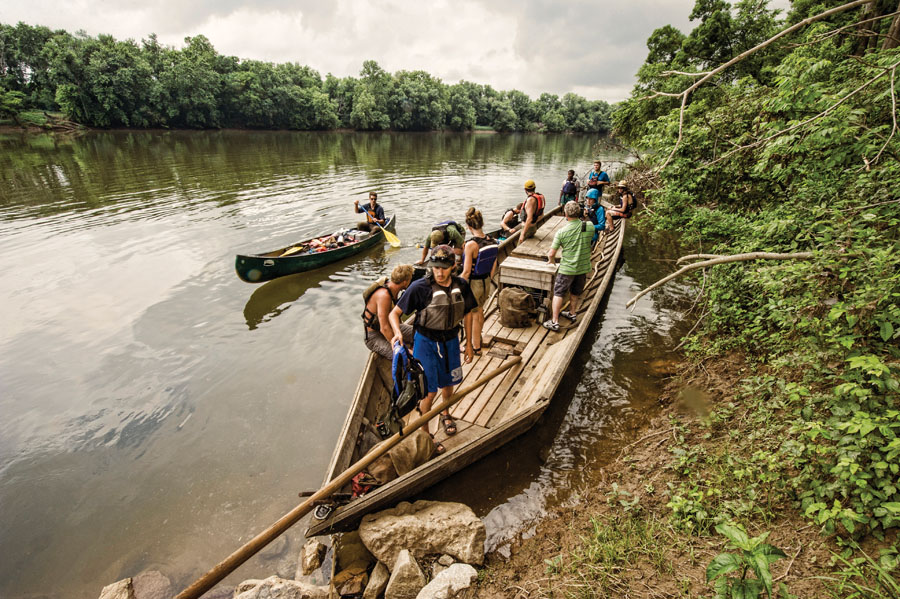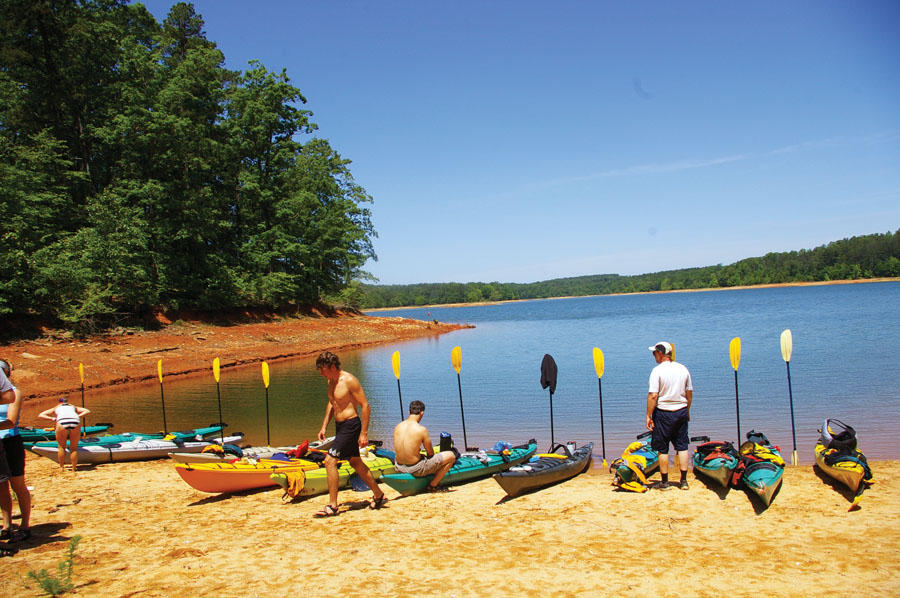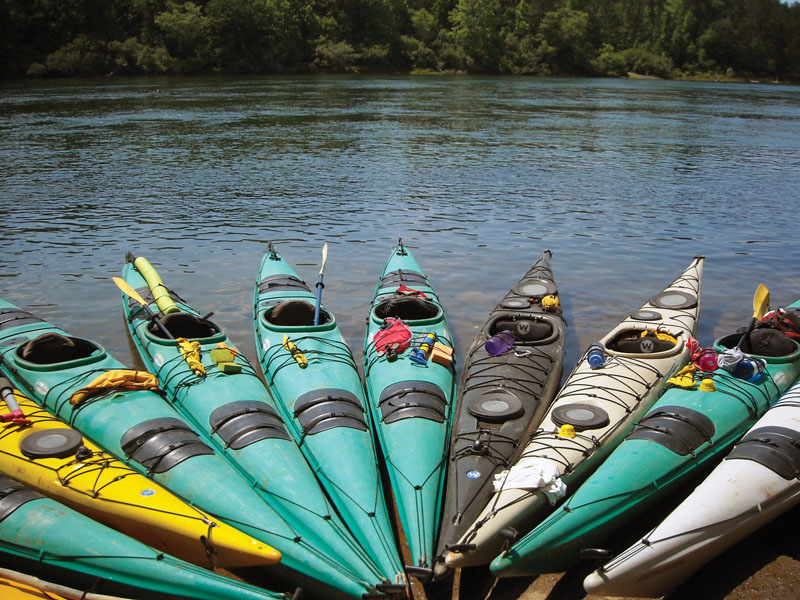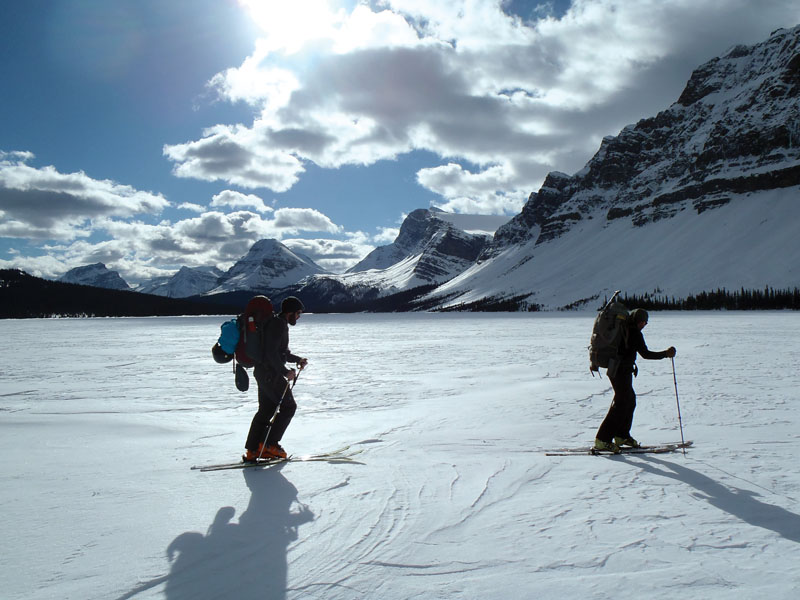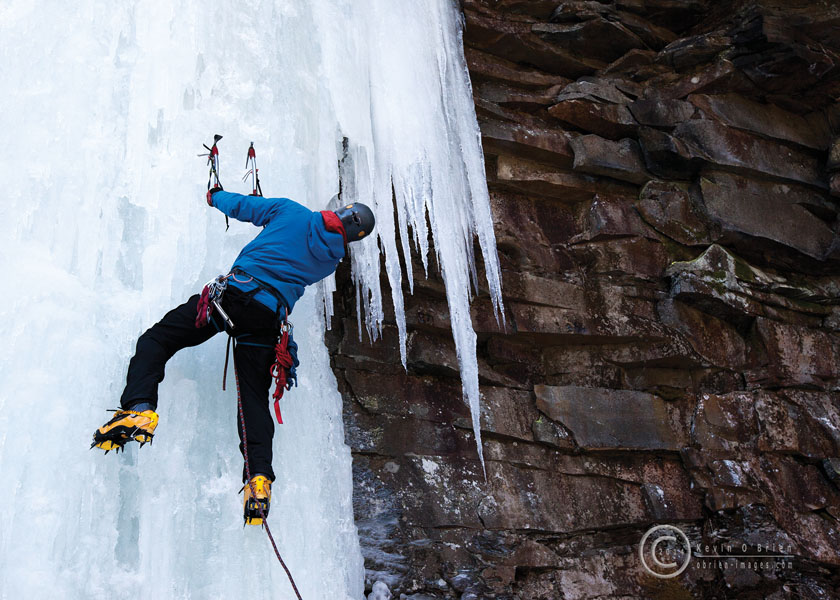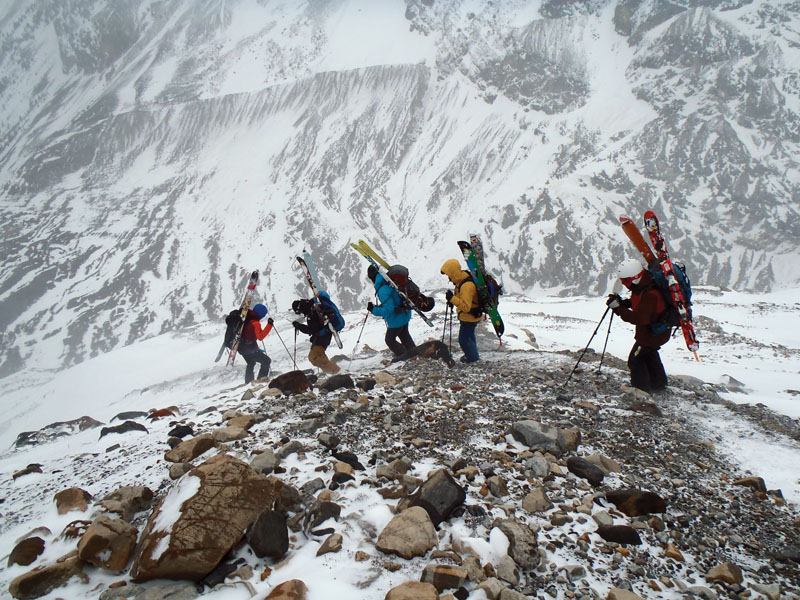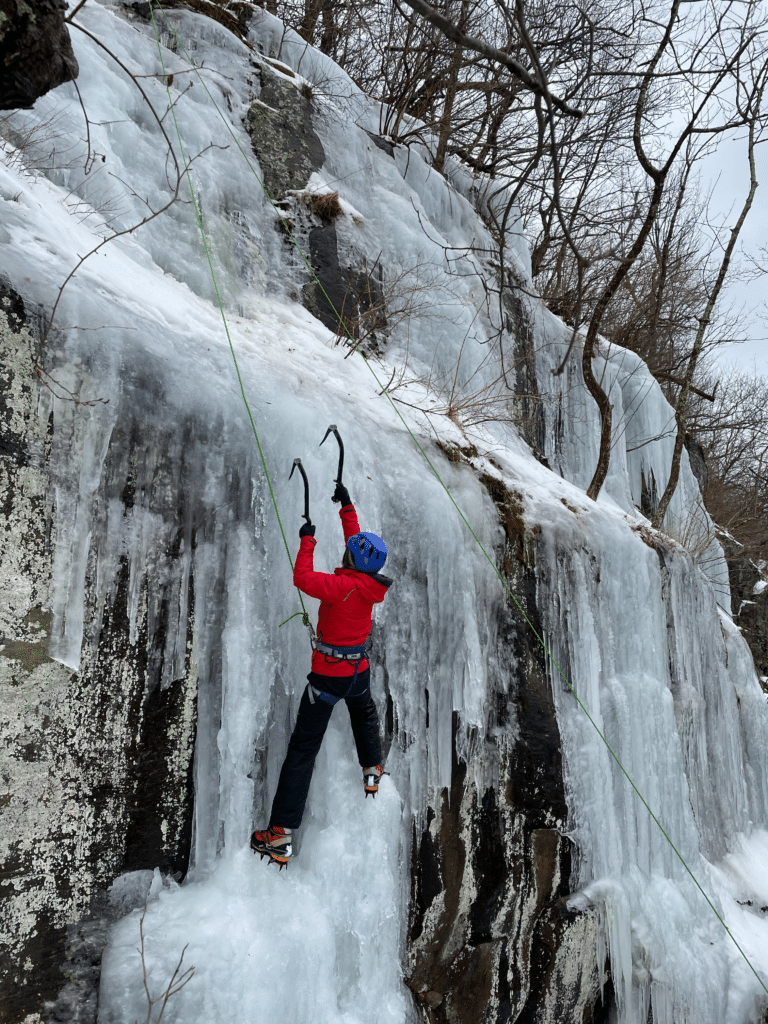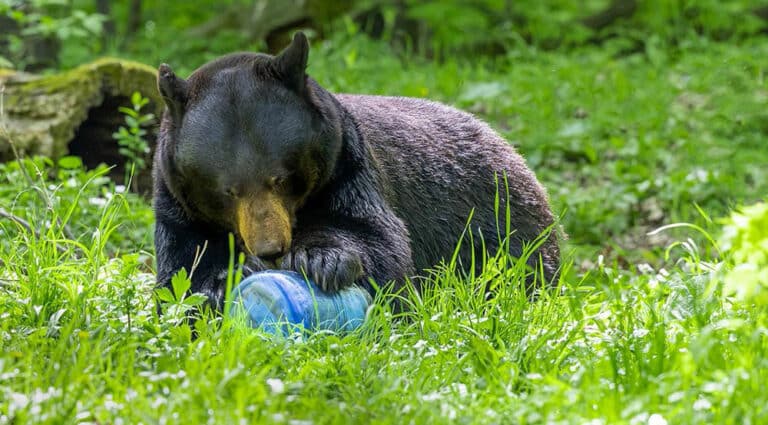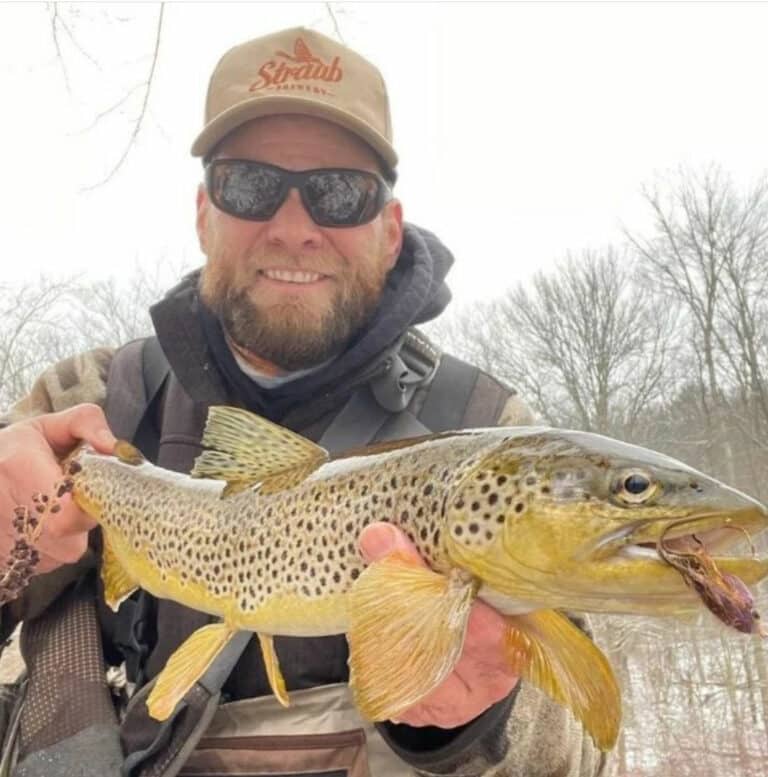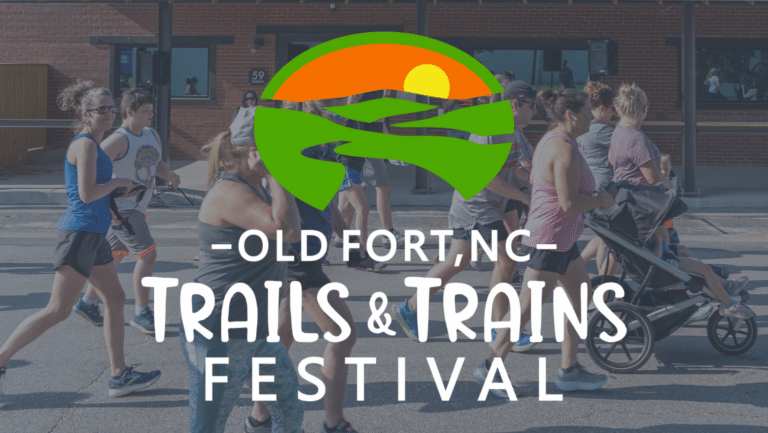TAKE A HIKE
Semester-A-Trail
Emory & Henry College
Emory, Virginia
Have you ever wanted to take six months off from life, pack your bags, and hit the trail? “Communing with nature and simplifying your life sounds romantic, but it is hard work,” says Semester-A-Trail and Emory & Henry Outdoor Programs Director Jim Harrison.
In 1997, Harrison and his wife Aliese completed a southbound thru-hike of the Appalachian Trail. Unrelenting hordes of mosquitoes and torrential weather plagued the couple during their 2,189-mile trek, but he says that despite the physical and mental battles, thru-hiking the A.T. proved to be more than just a long walk in the woods: it was a walk back to hope.
“The thru-hike experience renewed my faith in humanity,” Harrison says. “Without even knowing our real names, people of all creeds and socioeconomic backgrounds embraced us and our hiker smells, offering unconditional support and big smiles.”
Shortly after completing the trail, Harrison started working for Emory & Henry College. Inspired by his thru-hike, he immediately began planting the seeds for an outdoor program. Jason Hibbitts of Honaker, Va., was one of the first students to take part in Harrison’s hikes.
“I wanted to test my mettle and chase that wanderlust,” Hibbitts says. “There’s something spiritually humbling about having an experience you can’t buy your way out of.”
So, in 2006, Hibbitts headed south for Springer Mountain in Georgia and began his six-month courtship with the white blaze.
“Thru-hiking is great because you’re challenging yourself to see the world in a different way than you might in a classroom,” Hibbitts says. “I was accountable for my own learning. No one’s going to make you get up at 6 a.m., lace up your boots, then hike 20 miles,” but he did, and came out at Mount Katahdin stronger for it.
Today, students from any department can hike the trail and acquire 12 or more credit hours, though part-time enrollment is also available. Past students have incorporated projects in a variety of fields, ranging from psychology and wellness to community service and environmental science.
For rising junior and music education major Jon Ross of Knoxville, Tenn., that opportunity to combine academic pursuits with extracurricular interests is exactly what he’s looking for. In the spring of 2016, Ross will begin his northbound journey along the A.T. in hopes of finishing before the fall semester of his senior year. And while long-distance backpacking certainly isn’t among the courses required for a degree in music education, Ross is ready to step beyond the borders of his comfort zone in search of challenge, fresh air, and a dash of inspiration.
“I’m hoping [the thru-hike] will give me a little time to be with myself and figure out exactly where the creativity in my mind wants to wander,” Ross says. “Along with my evolution as a person, I think I’ll grow as a musician as well.”
Students interested in the Semester-A-Trail program should expect to work hard and think big. Prior to departure, thru-hikers-in-training will receive certifications in Wilderness First Aid (WFA) and CPR, complete nature writing and introductory backpacking courses, and submit a comprehensive trip plan (including risk management, budget, and logistics).
The program has seen such success that the college now plans to expand the Semester-A-Trail offering into an institute that would allow participants to transfer in and out from other schools or engage the program as a gap year.
FOR MORE INFO on Emory & Henry’s Outdoor Program and the Semester-A-Trail experience, contact Jim Harrison at [email protected] or visit ehc.edu/student-life/outdoor-program
EHC FAST FACTS
Population: 1,012 undergrad
Outdoor Rec degree: No
Outdoor club: Yes – E&H Outdoor Programs
On-campus adventure: Climbing wall, bouldering cave, 18-hole disc golf course, indoor pool
[nextpage title=”next page”]
DIVE DEEP
SCUBA
Pennsylvania State University
State College, Pennsylvania
Escape the rat race pace of your concrete jungle by suiting up in a pair of flippers and taking the plunge. Between Pennsylvania State University’s for-credit SCUBA courses and the Nittany Divers SCUBA Club, students of any ability level can explore the underwater worlds surrounding State College, Penn., just about every day of the week, every month of the year.
“We start out with swimming, then snorkeling, then gearing up in SCUBA equipment and getting you to float neutrally under the water,” says Paul Rentschler, a certified SCUBA instructor through the National Association of Underwater Instructors (NAUI) and the current SCUBA Diving Supervisor at Penn State.
Rentschler first acquired a love for SCUBA when he himself attended Penn State as an undergraduate in the electrical engineering department. Having already participated in a dive course at a nearby shop in Reading, Penn., Rentschler turned to the Nittany Divers to satisfy his thirst for more. The diving club, which was founded in 1967, took his SCUBA skills to new heights, and lower depths.
“It’s very freeing and it’s very peaceful,” Rentschler says of SCUBA diving. At Penn State, students can have that experience and learn the art of SCUBA for college credit during an eight-or 15-week beginner’s course.
“It’s just a lot of fun exploring a whole different world,” says Penn State alumnus Matt Vinciguerra (’07). “Each class I took, I learned more about SCUBA diving, and the more you learn, the safer you can be.”
Advanced SCUBA, SCUBA Rescue Diver, Training Assistant, Dry Suit Diver: for someone who went SCUBA diving as much as Vinciguerra, even if it wasn’t as part of a for-credit class, it may come as a surprise that he majored in astrophysics instead of, say, marine science. And while he now maintains a full-time job as an engineer, he regularly instructs at Neptune’s Realm SCUBA Center in Avondale, Penn and has been on almost 600 dives from Cozumel to Australia’s Great Barrier Reef.
PSU FAST FACTS
Population: 46,000 undergrad
Outdoor Rec degree: Yes – BS/MS: Recreation, Parks, and Tourism Management
Outdoor club: Yes – Penn State Adventure Recreation
On-campus adventure: Indoor pool, indoor ice arena, Stone Valley Recreation Area
[nextpage title=”next page”]
PADDLE THE SOURCE
Voice of the Rivers
Brevard College
Brevard, North Carolina
At Brevard College, experience is everything.
But, according to Wilderness Leadership and Experiential Education (WLEE) Associate Professor Clyde Carter, the school doesn’t promote just any type of experience.
“The [outdoor] industry wants to hire people with a lot of ‘personal experience,’” Carter says, “whether you’re swimming through a class IV or you get stuck on the side of Looking Glass during a storm, that all deals with personal experience.”
That idea of living and learning, sometimes the hard way, is exactly how Carter found himself at Brevard College. In 1989, Carter convinced the college’s president to hire him as the director of an outdoor program that didn’t exist yet, but would be unlike anything else at the time. With the help of outdoor legends such as National Outdoor Leadership School (NOLS) founder Paul Petzoldt, Carter crafted an outdoor program and degree based on part-theory, part skin-your-knee trial and error.
“That’s why [experience] is in our title, Wilderness Leadership and Experiential Education,” Carter says. “We put [the students] in real situations, but there is a safety net to some degree. If they make a wrong turn, as long as there’s not a life in danger, I’m gonna walk behind them with a smile on my face, even if it means we’re out there till dark.”
In 1997, Carter, whose own early outdoor adventures were fraught with one-too-many close calls on flooded sections of the Chattooga River and self-guided tours through unknown routes in the Tetons, sat down again with the college faculty to propose another opportunity for students to implement classroom ideas into the real world: an extended paddling trip from source to sea. Surprisingly, the college supported the expedition, and Voice of the Rivers (VOR) was born.
“The goal is not a wilderness program, though we’re camping out and paddling the whole thing,” Carter says. “The goal is to meet as many people as possible who work on the river, recreate on it, depend on it, and hear their stories.”
Additionally, the VOR trip is open to students from any department, not just the WLEE program. Criminal justice, environmental studies, music education, and even theater majors have found their way onto a VOR trip, and according to WLEE major and VOR alumna Kelsey Bracewell (’09), the diversity of backgrounds was what made the three-week trip so special.
“I remember sitting there on the water near the end of the trip and thinking we were just crushing it,” Bracewell says. “I was really impressed with how our group performed that day,” noting that, though her fellow students all had varying degrees of experience in a sea kayak, the three weeks of paddling and backcountry living in a group setting had gone relatively incident-free. “We had all worked really hard to get that far,” she adds, from logistics and risk management, to researching regional literature and sea kayak training.
The VOR program has taken students on a number of different source-to-sea journeys, from the Brevard campus to New Orleans, from Henderson County to Charleston, S.C., from Cashiers, N.C., to Savannah, Ga., and even an extended three-month expedition on Patagonia waterways.
BC FAST FACTS
Population: 701 undergrad
Outdoor Rec degree: Yes – BA: Wilderness Leadership & Experiential Education (WLEE)
Outdoor club: Yes – Climbing Team, Outing Club, Paddling Club, Cycling Team
On-campus adventure: Bracken Preserve
[nextpage title=”next page”]
CLAMP ON CRAMPONS
Ice Climbing
Garrett College
McHenry, Maryland
Winters in the mid-Atlantic always mean unavoidable element: ice. While unfortunate for skiers and snowboarders, the ice in the Mid-Atlantic is prime for ice climbing.
“No one really knows what to expect from an ice climbing class,” says Andrew Hershey, an Associate Professor with the Adventuresports Institute (ASI) at Garrett College. “It wouldn’t be hard, you’d think, to get people to sign up, but even Adventuresports students are intimidated by cold weather activities.”
ASI student Kayley Green was just that: intimidated, hesitant, and, truth be told, a little nervous. Though actively involved in the ASI program and an avid climber, ice climbing was foreign territory.
“I’d never been ice climbing before and I really, really hate cold weather,” Green says. “And I hate snow.”
Despite having doubts, Green enrolled in the course anyway, and in January of 2015, after a 15-hour drive north to the Catskills of New York, she found herself enthralled by some of the East Coast’s most pristine ice formations.
“When students get out there, most of them typically really, really love it,” Hershey says, despite facing low temperatures, unpredictable weather, and often brutal wind.
The ice-climbing course takes place over the span of five days, and though the early years of the course were spent right down the road in Savage River State Forest, the crew now heads north.
“We cover all the basics of ice climbing,” Hershey says. “We look at understanding how ice is formed, how to evaluate ice, how to swing your ice tools, how to move on lower angle ice,” all of which, he says, is founded on the students’ knowledge of basic rock climbing skills, which they accumulate through prerequisite classes in introductory top rope and multipitch climbing.
GC FAST FACTS
Population: 769 undergrad
Outdoor Rec degree: Yes – Associates in Applied Science Degree (AAS) in Adventure Sports Management; B.S. Adventuresports Management 2+2 Program through Frostburg State University
Outdoor club: No
On-campus adventure: Climbing wall, indoor pool, low element challenge course, Wisp Resort and Deep Creek Lake within sight
WATCH VIDEO Garrett College students talk about adventure, past and present, at BlueRidgeOutdoors.com
[nextpage title=”next page”]
LEARN TO LEAD
Principles of Field Leadership
Georgia College
Milledgeville, Georgia
It’s one thing to know how to keep yourself safe in the backcountry. It’s another thing entirely to facilitate a group experience in the outdoors and not only keep those people safe, but also teach them something in the process. Georgia College’s Principles of Field Leadership class provides students with a framework to do just that.
“This course tends to show students that leadership is less of a coat in the closet that you put on when it’s your time to lead—it’s more of you being comfortable in your own skin,” says course professor Dr. Will Hobbs.
It’s called “field leadership” for a reason. Students spend just a couple days in the classroom preparing for the pinnacle of the course, a 12-day backcountry trip. The goal?
“Humility,” Hobbs says. “Students come into the class thinking, ‘I got this dialed,’” but anyone who has spent more than a week in the woods with the same group of 10 people knows it’s not that easy. Just ask outdoor education senior Cole Wilson who says the interpersonal skills he learned during those 12 days were invaluable.
“Three or four years ago, I would have viewed a leader as this concrete, almost president-like figure,” Wilson says. “Now I realize that there is so much more that goes into it, and it’s a lot about relationship building. A good leader doesn’t always get noticed.”
Wilson’s come a long way since he first entered Georgia College as a programming and networking major. Wilson found something during a summer backpacking trip that he wasn’t expecting: identity.
“I always had a passion for [working with] people, but in my mind, networking and programming wasn’t the way to do it,” Wilson says. So he changed majors and never looked back.
Hobbs knows that story all too well and says that accepting your identity and becoming a good leader go hand-in-hand.
“When I was 18, I was wrestling with ‘who am I?’ and had this mistaken idea that there was one thing that I was designed to do, one purpose, one job, one person, one career, one life path for me and if I didn’t discover that, then I’d be screwed for the rest of my life,” Hobbs says.
So how did he overcome these feelings of doubt and uncertainty? He took a hike to Old Rag in Virginia. Much like Wilson, Hobbs felt a certain peace as he gazed out at the expanse of rolling ridges and, for the first time, he felt like he belonged.
“I didn’t receive any answers immediately,” Hobbs says, “yet that recognition that there are systems at work that continue to function whether or not I exist was a humbling, frightening, and extremely freeing idea.”
It’s an idea which is integral to his course structure and what he hopes students will take away at the end of 12 days. The class is currently offered in May near the end of the spring semester.
GC FAST FACTS
Population: 5,729 undergrad
Outdoor Rec degree: Yes – B.S. in Outdoor Education
Outdoor club: Yes – Outdoor Recreation Education
On-campus adventure: Lake Laurel Lodge, challenge courses, two climbing walls, Lake Laurel, and 83 acres of forest and wetlands
[nextpage title=”next page”]
Best College Adventures
Check out these other great adventure courses and travel opportunities offered by colleges throughout the Southeast and Mid-Atlantic.
#1 Western Carolina University
Congratulations to WCU in Cullowhee, N.C. who again won Blue Ridge Outdoors’ Best Adventure College Bracket for the second year in a row.
With a Parks and Recreation Management degree, Base Camp Cullowhee outing program, internship opportunities with the National Park Service at Great Smoky Mountains National Park and the Nantahala Outdoor Center, and front door access to some of the Southeast’s greatest natural playgrounds, it’s no wonder students who want to be immersed in the outdoors come to this adventure oasis.
And to gain a familiarity of WCU’s backyard, what better way to do that than by backpacking and climbing for 10 days at some of the region’s iconic destinations like the Linville Gorge and Mount Mitchell? Wilderness Education is a three-credit class offering students the chance to learn the basics of expedition planning, leadership, and implementation while being immersed in true backcountry.
#2 Montreat College
Our second-place finisher in the Top Adventure College tournament goes to another western North Carolina school, where the small student body and hands-on learning opportunities create experienced leaders in the outdoors. Montreat, which is located in the shadow of Mount Mitchell and surrounded by national forest, offers a degree in Outdoor Education. The program emphasizes not only outdoor skills but also leadership training, environmental studies, and Christian faith.
Montreat’s 40/40 Wilderness Expedition takes students on a 40-day backpacking expedition in Wyoming that includes significant time living above 10,000 feet while also rock climbing, snow climbing and mountaineering, summiting multiple peaks.
Virginia Tech: Paddling over 50 miles of the San Juan River. Canyoneering in Moab. Enroll in Virginia Tech’s Venture Out spring break trips and discover some of the country’s best adventures.
UT Knoxville: Explore the Cumberland Plateau’s underground labyrinth of caves.
APPALACHIAN STATE:
The university’s Canadian Rockies Spring Break Backcountry Ski Expedition is a 14-day ski-mountaineering course spent in Banff, Canada.
George Mason University: Bikepack the C&O Canal, a 185-mile trail that runs from Washington, D.C., to Cumberland, Md.
Eastern Kentucky University: Don’t head south for spring break! Head north and ski the slopes of Vermont.
West Virginia University: Kayak, snorkel, swim, and camp in Manatee Springs, Cedar Key, St. Joseph Peninsula, and Ictucknee Springs in northern Florida. It’s the only way to spend your winter break.
UT Chattanooga: Take spring break and spend it sea kayaking for a week around Florida’s Cayo Costa Island.
Virginia Commonwealth University: Footprints on the James, a four-week kayak expedition navigating the James River.
University of Georgia: Backpack the Grand Canyon, a weeklong spring break excursion into the heart of one of America’s most treasured icons.
University of Virginia: Pump your arms out during a spring break climbing trip to the Red River Gorge in Kentucky.
University of Kentucky: Embrace your wild side during a weeklong spring break trip camping on beaches and exploring Georgia’s Cumberland Island.
Clemson University: Spring Break Mountain Biking is a weeklong stint of shredding Moab, Utah’s, sweet singletrack.
James Madison University: Immerse yourself for 10 days in the hostile yet awe-inspiring environment of Patagonia’s Torres del Paine National Park.
University of Pittsburgh: Embark on the Pitt Odyssey and explore the adventures located right out your dorm room door.
Liberty University: Ditch the books for the day and head to Liberty Mountain’s trail system, where students can get lost on over 65 miles of trails and logging roads that span across 5,000 acres.
Sewanee – College of the South: Spend winter break bagging 14ers in the San Juan Mountains of the Colorado Rockies.
Roanoke College: The sky’s the limit in Kitty Hawk, N.C., with an overnight camping trip, a hang gliding lesson, and a kayak tour through a maritime forest.
Davidson College: Canoe down the Rio Grande and experience Texas like you’ve never seen it.
Radford University: Rock climb, backpack, and learn the basics of mountaineering during a 14-day course to central Colorado and the Collegiate Mountain Range, where walking through waist-deep snow and fording equally deep rivers is standard passage.
North Greenville University: Enroll in the Wilderness Journey Practicum, a 15-day backpacking journey in which students will abide by a minimalistic style of living including boiling water for treatment and tarp camping.
UNC – Asheville: Push yourself, learn to cook in the backcountry, gain your CPR/AED and Wilderness First Aid certifications, and challenge your idea of leadership in the Outdoor Leadership Training Program.
Maryville College: Put your mind, and your body, to the test during the three-credit Human Perseverance and Endurance course.
Lees-McRae College: Feel good about going outside to play with Lees-McRae’s Outdoor Programs. These adventurous souls give back by helping with adaptive ski and climbing events across western North Carolina.
Warren Wilson College: Enroll in an international voyage aimed at studying environment, culture, & adventure tourism in Armenia.
Washington & Lee University: Ever wanted to see Belize in an authentic way? Spend a week on Glover’s Atoll SCUBA diving, kayaking, and snorkeling.
